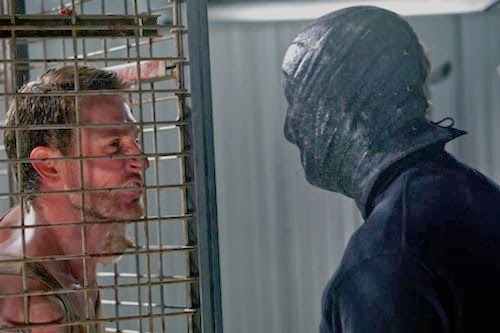The Bourne Legacy: 2012 action thriller directed by Tony Gilroy
and starring Jeremy Renner, Rachel Weisz, Joan Allen, and Edward Norton. Aaron Cross (Renner) is a field operative in
a top-secret like totally super secret shouldn’t even be happening Department
of Defense black ops program. While he’s
completing a training exercise in Alaska, a higher-up at DoD (Norton) realizes
that the program is at risk of exposure, so the best solution would be to just
kill everyone involved. A drone is sent
to kill Cross, but because he’s taking these fancy performance- and
intelligence-enhancing pills he manages to escape. He tracks down the last remaining biochemist
who worked on the program (Weisz) and manages to save her from CIA assassins, but
now they need to get their hands on more of those fancy pills before he goes
into withdrawal and turns into a bumbling idiot. Which won’t be great for their chances of
survival.
I
liked it, and I like Renner as a Bourne-esque offshoot. It’s a fairly good action movie, all in
all. And while I’m glad this reboot
happened for the aforementioned reasons, it certainly wasn’t necessary. So I’m torn.
It captured the feeling of the The
Bourne Identity, without getting bogged down like the two sequels that
followed it. In order to understand Legacy, it would help to see the first
movie and then skip the other two and then see this one. Which is essentially the same movie with
different characters.
The Collection: 2012 horror movie directed by Marcus Dunstan
and starring Emma Fitzpatrick, Christopher McDonald, Lee Tergesen, and Josh
Stewart. A serial killer dubbed The
Collector has kidnapped a young girl and her father recruits the killer’s only
known surviving victim to track him down.
It’s a preposterous sketch of a movie.
It’s boring and too outlandish - not in an inventive way. It seems to start midstream, and now that I
know it’s a sequel that makes sense.
Perhaps if it had been more interesting I would have gone back to The Collector and then started this
again, but that seems more effort than it would be worth.
Tabloid:
2010 documentary by Errol Morris, about Joyce McKinney’s bizarre tale of
love and misunderstanding. Or
kidnapping. You decide. In 1975 McKinney met Kirk Anderson in Provo,
Utah. She was a blonde, buxom former
Miss Wyoming; he was an upstanding young Mormon. According to her they began a torrid romance,
and his church whisked him off to the UK to keep them apart. She found him, rescued him, and tried to
break through the Mormon brainwashing with a weekend of wild, consensual
sex. According to the British tabloids
(and Anderson, and the courts) she developed an infatuation with him that he
did not reciprocate. When he was sent to
do his missionary work, she and a hired thug followed him, kidnapped him, and
then she sexually assaulted him. It’s a
bizarre he-said/she-said that deals with the tabloid media, journalistic
ethics, and the trustworthiness of seemingly emotionally unstable interview
subjects.
Sadly, the
documentary is not nearly as interesting as that synopsis makes it seem. Anderson declined to be interviewed for the
movie, so most of his side of the story is taken from former friends of
McKinney’s and the newspapers. And
McKinney seems totally whack-a-doo, but does that mean she’s lying? I found myself unable to side with either
party totally, which in the end didn’t matter because I wasn’t really invested
in the movie. It was fine, but Morris
has done far, far better.
Bully:
2011 documentary directed by Lee Hirsch about bullying in American
schools. It focuses on a slightly odd
but very endearing 14 year-old boy named Alex; a girl called Kelby who is
dealing with the fall-out after coming out as gay in a small Oklahoma town; and
14 year-old Ja’Meya, who was so fed up with being bullied that she pulled out a
gun on a crowded school bus and is now facing 45 felony charges. Surrounding these kids are terrified and
frustrated parents, school administrators both clueless and helpless, and the
bullies themselves.
The Bully
Project has now become a bit of a phenomenon, which is great. It’s moving the issue forward. I’m not happy that the filmmakers chose to
gloss over the preexisting mental health issues of a boy named Tyler Long – who
the movie asserts committed suicide solely because he was bullied, because I
think that’s absolutely part of the larger conversation. That being said, it’s definitely worth
seeing.
It’s a
deeply upsetting film, a great conversation starter, and pretty much universally
relatable. Everyone goes through this to
varying degrees – be prepared for it to hit a nerve.
Chapter 27: 2007 drama directed by Jarrett Schaefer and
starring Jared Leto and Lindsay Lohan, about the murder of John Lennon. I was annoyed within the first three
minutes. While I appreciate Leto’s
commitment to embodying Mark David Chapman with the weight gain and that
horrible voice and the mannerisms, that’s about all the positive feeling I can
muster for this. The music seems
desperate to make the movie quirky. The
narration is fucking terrible. And
though Lindsay Lohan seems so normal in this movie as to be shocking, her
character is rather pointless. She is apparently
there to provide a human connection for Chapman, a reaching out from the
universe towards this lonely, unbalanced man.
What total shit.





No comments:
Post a Comment